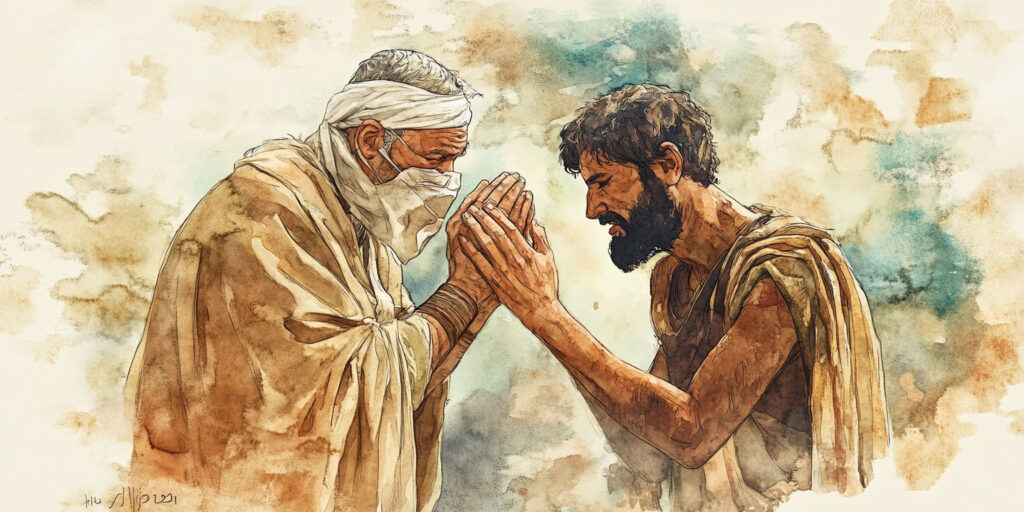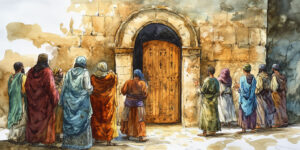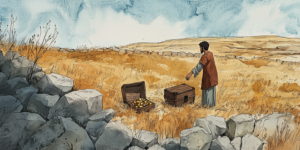
The Tree of Life OR?
Eden wasn’t just beautiful—it was ideal. God created it as a place for Adam and Eve to live in perfect harmony with each other, and with Him. But there was

On the way to Jerusalem he was passing along between Samaria and Galilee. And as he entered a village, he was met by ten lepers, who stood at a distance and lifted up their voices, saying, “Jesus, Master, have mercy on us.” 14When he saw them he said to them, “Go and show yourselves to the priests.” And as they went they were cleansed. Then one of them, when he saw that he was healed, turned back, praising God with a loud voice; and he fell on his face at Jesus’ feet, giving him thanks. Now he was a Samaritan. Then Jesus answered, “Were not ten cleansed? Where are the nine? Was no one found to return and give praise to God except this foreigner?” And he said to him, “Rise and go your way; your faith has made you well.”
Luke 17:11-19
In Luke 17, we find an episode in Jesus’ ministry that is both deeply profound and incredibly relevant to our lives today. It is a story that highlights God’s authority over illness, the power of faith, and the importance of gratitude.
As Jesus made His way to Jerusalem, Luke tells us that He passed between Samaria and Galilee—a region marked by deep social and religious divisions. The hostility between Jews and Samaritans had festered for centuries, leading to bitterness and rejection. It was in this borderland, a place of exclusion, that Jesus encountered ten men suffering from leprosy.
Leprosy in the first century was a devastating disease that led to complete social isolation. Those afflicted were forced to live apart from the community, calling out “Leper, leper!” to warn others of their presence. They were avoided, feared, and seen as spiritually unclean. Their suffering was not only physical but emotional and spiritual as well.
Unlike the Samaritan villagers who rejected Jesus earlier in His journey, these ten lepers did not turn Him away. Instead, they called out to Him with urgency and desperation: “Jesus, Master, have mercy on us!” (Luke 17:13). Their plea was not merely for physical healing but also for mercy—perhaps believing, as many did at the time, that their illness was a direct result of personal sin.
Jesus responded to their cry not with immediate healing but with a command: “Go, show yourselves to the priests.”(Luke 17:14). According to Jewish law, only a priest could officially declare a leper clean and allow them to reintegrate into society. The remarkable thing about this command is that the men were not yet healed when Jesus gave it. They had to step out in faith, obeying His words before seeing any evidence of healing.
As they walked, their bodies were restored. Can you imagine their joy? Hands that had been numb and disfigured were now whole. Faces once covered in sores were smooth again. For the first time in years, they could return to their families, their homes, and their lives. Their dreams of normalcy were finally within reach.
But here is where the story takes a surprising turn. Of the ten men who were healed, only one returned to thank Jesus. Just one.
And he was a Samaritan.
The least expected person in this group—the one considered an outsider—was the only one who came back. He fell at Jesus’ feet in overwhelming gratitude, praising God.
Jesus then asked a striking question: “Were not ten cleansed? Where are the nine?” (Luke 17:17). His words reveal not a need for human validation but a concern for the hearts of those He healed. He desired more than their physical restoration—He wanted them to recognize the deeper transformation He offered.
Jesus’ reaction to the Samaritan man teaches us that gratitude is not just about good manners—it is about our spiritual health. It reflects our understanding of who God is and what He has done for us. Gratitude is the natural response of a heart that truly sees and values God’s mercy.
So why did the other nine not return?
Perhaps they were so focused on their newfound freedom that they forgot the One who had given it.
Maybe they assumed Jesus already knew they were thankful.
It’s possible they felt entitled to the healing, believing it was long overdue.
Whatever the reason, they missed an important truth: Gratitude deepens our relationship with God.
In many ways, we are like the ten lepers. We have all suffered the effects of sin, brokenness, and spiritual separation. Jesus, in His mercy, has offered us healing—not just physically, but in the deepest parts of our souls.
The question is: Have we returned to thank Him?
Gratitude is not just about saying “thank you.” It is about recognizing that we owe everything to God. It shifts our focus from what we lack to what we have received. It fosters humility and reminds us of our dependence on Him.
How can we cultivate a heart of gratitude?
Acknowledge God’s gifts daily. Take time each day to reflect on the blessings—both big and small—that God has given you.
Express thanks openly. Whether in prayer, through worship, or by sharing your testimony, let your gratitude be known.
Live a life of gratitude. True thankfulness is shown in our actions—serving others, giving generously, and living in obedience to God.
The Samaritan leper who returned to Jesus made a second visit—a visit of gratitude. Many people encounter Jesus and receive His blessings, but fewer return to truly worship Him. The second visit is what transforms us.
Silent gratitude is not enough. Just as the leper fell at Jesus’ feet, we too should express our thankfulness boldly and joyfully.
Jesus told the grateful man, “Rise and go; your faith has made you well.” (Luke 17:19). The word for “made well” can also mean “saved.” While all ten were healed physically, only this man received the deeper healing of salvation.
May we all be like the one who returned. May we live each day in gratitude, never forgetting the mercy, grace, and love that God has poured into our lives.

Eden wasn’t just beautiful—it was ideal. God created it as a place for Adam and Eve to live in perfect harmony with each other, and with Him. But there was

Jesus knew that before He could return to His rightful place in heaven, He had to endure betrayal, mockery, and immense pain. Yet, He pressed forward with unwavering determination…

The Bible is filled with deep irony, and one of the most profound examples occurs as Jesus prepares for His final journey to Jerusalem. Just as He transformed the Passover

Faith is not merely spoken; it is demonstrated. Baptism is an act of obedience, a public declaration of our faith in Jesus Christ.

Through the parables of the hidden treasure and the pearl of great price, Jesus communicates a powerful truth: discovering the kingdom of God is worth more than anything else in

Jesus declares, “I am the true vine, and my Father is the vinedresser.” This imagery contrasts Israel’s failure to produce spiritual fruit with Christ’s perfect fulfillment of God’s purpose.